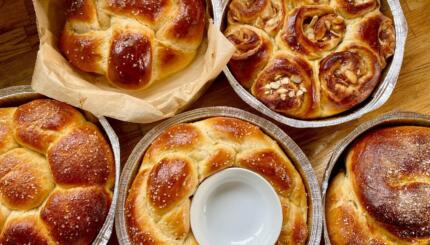On both days of Rosh Hashanah and on Yom Kippur, the magnificent Unetanah Tokef (“We shall ascribe holiness to this day”) is chanted prior to the Kedushah prayer. Although there are popular legends concerning the origin of this piyyut (liturgical poem), we do not know who wrote it. What is certain is that the poet was extremely gifted. The structure of the poem and its language suggest that it was composed during the Byzantine period.
Find the full text of the Unetanah Tokef in Hebrew and English here!
The concepts on which it is based come from Jewish apocalyptic literature and parallel Christian writings based on similar sources, the most famous of which is the Dies irae (day of wrath)—found in the requiem mass—which offers a vivid description of the day of judgment for all humankind. In Unetanah tokef, however, the subject is not the final judgment but the much more immediate, yearly day of judgment — Rosh Hashanah. The text of this piyyut follows.
We shall ascribe holiness to this day.
With your help, My Jewish Learning can provide endless opportunities for learning, connection and discovery.
For it is awesome and terrible.
Your kingship is exalted upon it.
Your throne is established in mercy.
You are enthroned upon it in truth.
In truth You are the judge,
The exhorter, the all‑knowing, the witness,
He who inscribes and seals,
Remembering all that is forgotten.
You open the book of remembrance
Which proclaims itself,
And the seal of each person is there.
The great shofar is sounded,
A still small voice is heard.
The angels are dismayed,
They are seized by fear and trembling
As they proclaim: Behold the Day of Judgment!
For all the hosts of heaven are brought for judgment.
They shall not be guiltless in Your eyes
And all creatures shall parade before You as a troop.
As a shepherd herds his flock,
Causing his sheep to pass beneath his staff,
So do You cause to pass, count, and record,
Visiting the souls of all living,
Decreeing the length of their days,
Inscribing their judgment.
On Rosh Hashanah it is inscribed,
And on Yom Kippur it is sealed.
How many shall pass away and how many shall be born,
Who shall live and who shall die,
Who shall reach the end of his days and who shall not,
Who shall perish by water and who by fire,
Who by sword and who by wild beast,
Who by famine and who by thirst,
Who by earthquake and who by plague,
Who by strangulation and who by stoning,
Who shall have rest and who shall wander,
Who shall be at peace and who shall be pursued,
Who shall be at rest and who shall be tormented,
Who shall be exalted and who shall be brought low,
Who shall become rich and who shall be impoverished.
But repentance, prayer and righteousness avert the severe decree.
For Your praise is in accordance with Your name. You are difficult to anger and easy to appease. For You do not desire the death of the condemned, but that he turn from his path and live. Until the day of his death You wait for him. Should he turn, You will receive him at once. In truth You are their Creator and You understand their inclination, for they are but flesh and blood. The origin of man is dust, his end is dust. He earns his bread by exertion and is like a broken shard, like dry grass, a withered flower, like a passing shadow and a vanishing cloud, like a breeze that blows away and dust that scatters, like a dream that flies away. But You are King, God who lives for all eternity! There is no limit to Your years, no end to the length of Your days, no measure to the hosts of Your glory, no understanding the meaning of Your Name. Your Name is fitting unto You and You are fitting unto it, and our name has been called by Your Name. Act for the sake of Your Name and sanctify Your Name through those who sanctity Your Name.
These words lead directly into the Kedushah, the prayer of the sanctification of God’s name.
Many consider this poem to be the pinnacle of the Rosh Hashanah liturgy. The poet has painted a picture of the most solemn day of the year, which to him is Rosh Hashanah, not Yom Kippur. All other concepts associated with the day have been stripped away. “Awesome and terrible” are the only fitting words to describe it. The poet’s primary concern is with the Mishnah’s description of the first of Tishre as the day when humanity is judged. And he fills in the details that the Mishnah only hints at to spread before us a terrifying spectacle of heaven and earth called to judgment.
But this is not a day of suffering without hope. No matter what one has done, says the poet, the severe decree‑-the penalty of death‑-can be averted. Indeed, one need only follow the advice of the sages, “Three things cancel the decree, and they are prayer, charity, and repentance” (Genesis Rabba 44:12). This rabbinic teaching is not confined to Rosh Hashanah but speaks in general terms of what one must do to avert the consequences of sin. The poet has set it correctly in the context of the day of judgment, focusing on the ten‑day period from the beginning of Rosh Hashanah until the end of Yom Kippur as a time when these three actions must be undertaken to change the outcome of the trial.
There is a further note of hope expressed in this poem. God is depicted as a merciful judge who understands the frail nature of human beings. The pathetic description of the transitory nature of life and the heartrending comparison between eternal God and human beings who are no more than “a dream that flies away” or a speck of dust that is gone with the wind are not intended to depress us but to impress God, as it were, and make Him incline toward forgiving us.
It is little wonder that this poem gave birth to legend. It is said that it was recited by Rabbi Amnon (Mainz, c. 11th century), who had failed to reject a proposal of apostasy immediately and instead asked for three days to consider it. When he did not agree to give up his faith, he was taken away and tortured brutally. It was Rosh Hashanah, and he asked his disciples to take him to the synagogue, where he interrupted the service and recited this prayer in order to sanctify the name of God. Upon completing the recitation, he died. Later, the legend continues, he appeared to Rabbi Kalonymus in a dream and asked that this prayer be recited each year.
Moving as this legend is, it should not distract us from the piyyut itself, the subject of which is not martyrdom, but human responsibility and the possibility for change, as we face the judgment of our creator.
This article is excerpted from Entering the High Holy Days. Reprinted with permission from the Jewish Publication Society.
Mishnah
Pronounced: MISH-nuh, Origin: Hebrew, code of Jewish law compiled in the first centuries of the Common Era. Together with the Gemara, it makes up the Talmud.
Rosh Hashanah
Pronounced: roshe hah-SHAH-nah, also roshe ha-shah-NAH, Origin: Hebrew, the Jewish new year.
shofar
Pronounced: sho-FAR or SHO-far, Origin: Hebrew, a ram’s horn that is sounded during the month of Elul, on Rosh Hashanah, and on Yom Kippur. It is mentioned numerous times in the Bible, in reference to its ceremonial use in the Temple and to its function as a signal-horn of war.
Yom Kippur
Pronounced: yohm KIPP-er, also yohm kee-PORE, Origin: Hebrew, The Day of Atonement, the holiest day on the Jewish calendar and, with Rosh Hashanah, one of the High Holidays.



